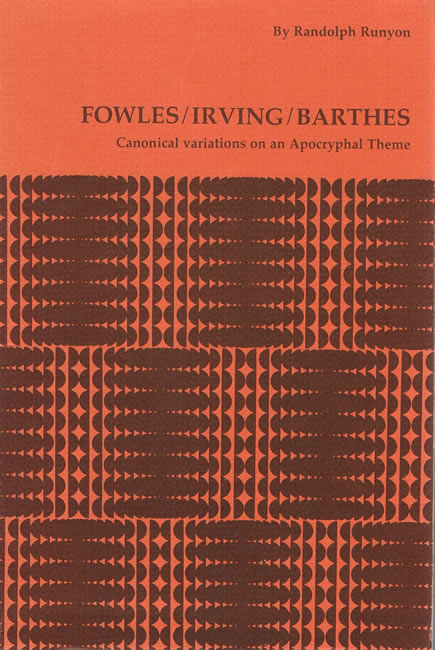Fowles, Irving, BarthesCanonical Variations on an Apocryphal ThemeRandolph Runyon |
 1981 Literary Criticism / General 121 pp. 6x9 |
|||
|
read the full text of the book •
|
A canon, according to a definition offered by John Dowland in 1609, “is an imaginarie rule, drawing out that part of the Song which is not set downe out of that part which is set downe.” Professor Runyon finds that prescription particularly apposite in considering the work of three important contemporary writers: John Fowles (The French Lieutenant’s Woman and Daniel Martin), John Irving (The World According to Garp and The Water-Method Man), and Roland Barthes (Fragments d’un discours amoureaux). These works, he argues, can all be read as variations on the same story—one ultimately traceable to a fairly widely known text in the Old Testament Apocrpha, the Book of Tobit, in which an angel instructs an errant son on how he may win a bride and cure the blindness of his father by seizing and eviscerating a leaping fish. In a work that claims thirteen books within its critical compass, and extends discussion beyond the three writers who are its immediate subjects to include such other and diverse figures as Balzac, Boethe, John Barth, Robert Persig, and Johann Sebastian Bach, Dr. Runyon succeeds in establishing a context for these multivarious works, and in making thereby a major contribution toward bridging the gap between American and Continental schools of criticism. Fowles, Irving, and Barthes, he finds (as well as Goethe and Balzac), both illuminate and are illumined by the Book of Tobit and by one another; and though it is by no means clear that each work by each writer was influenced by that ancient text in the usual sense of conscious inspiration, when read within the perspective that the tale provides, each exhibits a unity not revealed heretofore. And because all are read anew in the aggregate, as parts of a previously unsuspected whole, this same unity is discovered in the group, and something like a canon emerges. Randolph Runyon is an assistant professor of French at Miami University. | |||

